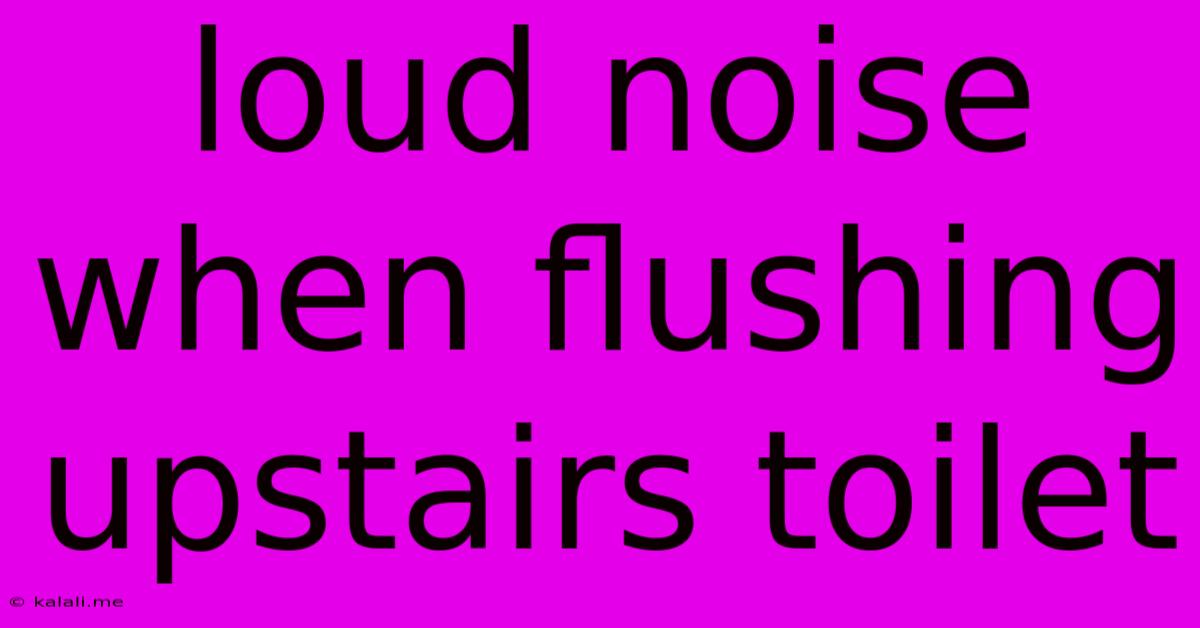Loud Noise When Flushing Upstairs Toilet
Kalali
May 20, 2025 · 4 min read

Table of Contents
Loud Noise When Flushing Upstairs Toilet: Troubleshooting the Rumble
A loud bang or rumble when flushing your upstairs toilet is more than just annoying; it can be a sign of underlying plumbing issues. This frustrating noise often stems from a pressure imbalance in your plumbing system, but it could also indicate more serious problems requiring professional attention. This guide will walk you through the common causes and troubleshooting steps to silence that disruptive flush.
Why is my upstairs toilet so loud when flushing? The most likely culprit is air pressure fluctuations in your plumbing pipes. When you flush, the sudden rush of water can create a vacuum or pressure surge, resulting in the loud noise. This is particularly common in older homes or those with complex plumbing systems. However, other issues, such as problems with your fill valve, flapper, or even the toilet itself, could be the source.
Common Causes and Solutions
Here's a breakdown of the most frequent reasons behind a noisy upstairs toilet flush, along with practical solutions:
1. Air in the Pipes: This is the most common cause. As water rushes down the drain, air trapped in the pipes can create a vacuum, causing a loud bang or whooshing sound.
- Solution: The simplest fix is often to check for air in the pipes. Open a faucet on a lower floor while flushing the upstairs toilet. This allows air to escape into the open faucet, reducing the pressure differential and minimizing the noise. If this doesn't work, you may need to bleed air from the system. This often involves locating and opening air release valves (if your system has them), though this is best left to a plumber if you're unsure.
2. Water Pressure Issues: High or low water pressure can both contribute to a loud flushing noise. High pressure can cause excessive force, leading to banging, while low pressure may create a vacuum as the water struggles to move through the pipes.
- Solution: Check your home's main water pressure. A pressure gauge on the main water line will give you an accurate reading. If the pressure is too high, you might need a pressure regulator installed. Low pressure might require investigation into the main water supply.
3. Faulty Toilet Fill Valve: A malfunctioning fill valve might not fill the tank properly, resulting in a louder flush. It could be filling too slowly or rapidly, disrupting the water pressure equilibrium.
- Solution: Inspect the fill valve. Listen for any unusual noises during filling. If it’s leaking, sputtering, or not filling the tank consistently, replacement may be necessary. This is a relatively easy DIY repair, but if you are uncomfortable, it’s best to call a plumber.
4. Worn-Out Flapper: A flapper that doesn’t seal properly can allow water to continuously leak from the tank, again impacting the water pressure during flushing and leading to noisy flushes.
- Solution: Examine the flapper for wear and tear. If it’s damaged or doesn't create a tight seal, it needs replacing. This is another straightforward DIY repair with readily available replacement parts.
5. Toilet Supply Line Problems: The supply line that feeds water to your toilet can become loose or kinked, causing pressure fluctuations.
- Solution: Check for any kinks or loose connections in the supply line. Secure the connection to ensure it’s firmly attached.
6. Plumbing System Design: In some cases, the plumbing system's design itself can contribute to noise. This is particularly true in older homes where pipe layouts might not be optimized for efficient water flow.
- Solution: Addressing this usually requires professional plumbing work, potentially involving rerouting pipes or installing water hammer arrestors to absorb pressure surges. This is a more complex and costly solution.
When to Call a Plumber
If simple troubleshooting doesn't solve the problem, it’s best to call a qualified plumber. They have the expertise to diagnose more complex issues and perform necessary repairs safely and effectively. This is especially important if you suspect problems with your main water line or overall plumbing system design. A persistent loud noise during flushing indicates a problem that won't go away on its own; addressing it promptly can prevent further damage and costly repairs down the line.
Latest Posts
Latest Posts
-
How To Take Off A Locked Door Knob
May 21, 2025
-
Why Do I Laugh At Serious Situations
May 21, 2025
-
How To Change The Voice Of Google Translate
May 21, 2025
-
How To Increase Shower Water Pressure
May 21, 2025
-
Short End Of The Stick Definition
May 21, 2025
Related Post
Thank you for visiting our website which covers about Loud Noise When Flushing Upstairs Toilet . We hope the information provided has been useful to you. Feel free to contact us if you have any questions or need further assistance. See you next time and don't miss to bookmark.